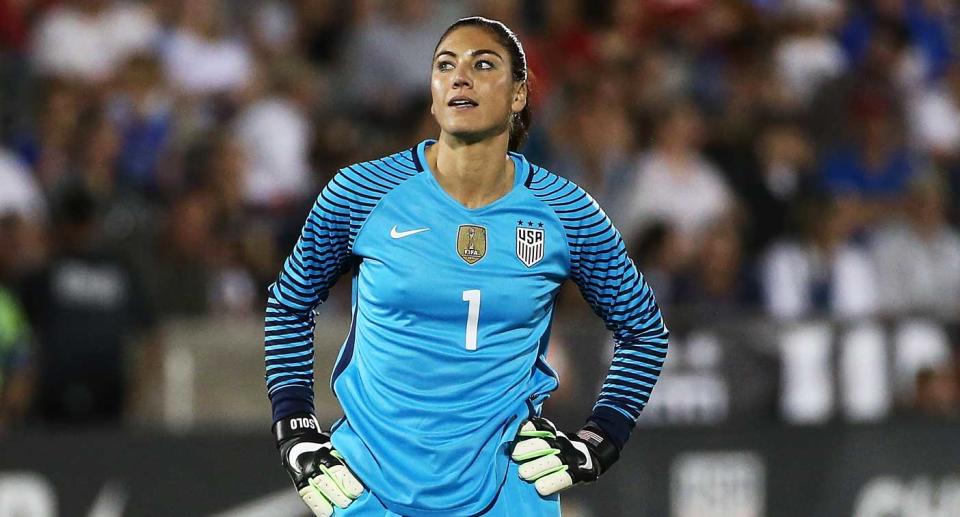How should we remember Hope Solo after a brilliant and troubled career?

If we’re being quite honest, Hope Solo’s United States women’s national team career is probably already over. On Thursday, the defending Women’s World Cup champions play the first of their final pair of friendlies of 2016 against Romania.
Solo won’t be there, still in the midst of a suspension that will keep her off the team until late February. Her comments at the Olympics that Sweden were “cowards” for playing defensively when they knocked the Americans out in the quarterfinals were deemed beyond the pale by U.S. Soccer. It was a final straw type of thing, of course, with an endless string of embarrassing and intolerable incidents and infractions piling up over the course of years.
As it happens, Solo is recovering from another shoulder surgery anyway, after sitting out the tail-end of her club season with the Seattle Reign as well. At 35, Solo has more soccer in her. And even though we saw the cracks starting to form in the foundation of her boundary-breaking game at the Rio Olympics, when she conceded a pair of goals against Colombia you’d never expect her to cough up, she can surely still be helpful to the national team.
She probably won’t get the chance. Her contract was canceled when she was suspended, meaning, essentially, that she’s no longer a U.S. Soccer employee, unlike her teammates. Even in previous suspensions, the federation had never gone that far.
The unspoken message seems to be plain: “You’re done here, Hope.”
She certainly thought so herself. “Seventeen years,” Solo screamed in a recording of her learning of the suspension, “and it’s over.”
Maybe she’ll play abroad for a spell. Perhaps she’ll return to the National Women’s Soccer League for a few more years, at the cut-rate salary she’d have to take as a non-national teamer. But after 202 national team caps and records for appearances and starts in goal, as well as wins and shutouts, it seems for all the world like the USA is moving on and not looking back at her.
It has Alyssa Naeher and Ashlyn Harris now, who are younger and will probably do just fine. They may not become mainstream superstars and transcend the position, the way Solo did, but it’s likely that they won’t pop up on TMZ or in the tabloids nearly as often either.
Which leaves us with the messy task of trying to work out what Solo’s national team legacy is.
You’d have a hard time making a case that she isn’t the best goalkeeper the women’s game has ever seen. A record two Gold Glove awards at the last two Women’s World Cups and a Bronze Ball in 2011 – a rarity for a goalkeeper – seem to support that empirically. At her peak, she kept the U.S. in games when they didn’t deserve to be, gracefully and reliable parrying shots bound with the net with almost total certainty. And, truthfully, she was still doing that in Brazil – saving the Americans again and again in a 1-0 group stage win over France, papering over deep cracks elsewhere on the field.
But then with Solo there was always the, um, other stuff. The domestic violence cases. The occasional bad sportsmanship. The instance of just plainly being a bad teammate at the 2007 World Cup, when she was benched in favor of veteran Brianna Scurry and let the world know just how she felt. The other run-ins with the law, like when her husband was arrested for DUI while driving a women’s national team van with her, also inebriated, in the passenger’s seat.
So how do you square those things? The goalkeeper who was better than any other goalkeeper before or since? And the PR liability? And, no matter how pat this sounds, the bad role model?
There’s simply never been such a divisive figure in women’s sports, who divvied up her own legacy between on-field brilliance and off-field embarrassment in more or less equal measure.
On the men’s side, however, there have been plenty of greats who were deeply troubled away from the field. Ty Cobb once boasted of killing a drifter, fought fans and even umpires. Richard Ben Cramer’s biography of Joe DiMaggio paints the picture of a fairly repugnant person, although he never got into any real trouble. Mickey Mantle was a hopeless philanderer and alcoholic. But in the remembrance of these men, all of this is whitewashed and the base hits and championships are noted before all else.
They were forgiven their terrible sins, if the public knew about them at all. Because these men had the benefit of living in an age when the press was complicit in keeping their misdeeds under wraps and their reputations in sterling condition. But even now that we know what they were really like, what we remember first is their achievements on the field.
Should Solo be extended that same courtesy? She almost certainly won’t. In the post-steroid era in baseball, plenty of its stars have been denied a place in the Hall of Fame on account of their cheating, even though it already included cheaters aplenty.
There’s no sense in glossing over Solo’s off-field issues. But it also isn’t entirely fair to discount everything she accomplished on the field. So long as she was allowed to be there, by the law and by her team, the final arbiters on her behavior, what she did counts.
Hope Solo was a stellar national team goalkeeper.
Hope Solo was a perennial problem case off the field.
Both of those things can be true. Both of those things can coexist.



